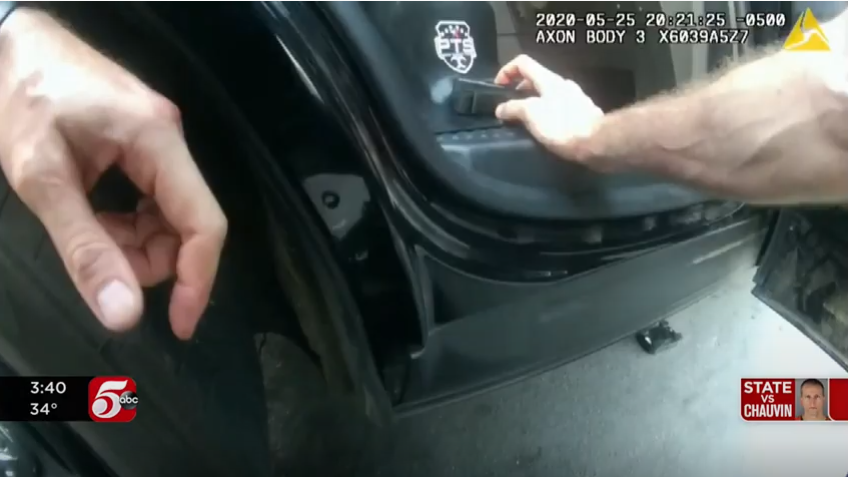
McMillian is extremely upset and describes feeling helpless.
Judge Cahill decides to call for a 10 minute break.
Judge Cahill decides to call for a 10 minute break.
https://twitter.com/CallanGrayNews/status/1377330985088516096
Back from break.
Eldridge has McMillian describe the video and his conversation with Floyd.
Eldridge, "What stood out to you about what Mr. Floyd was saying?"
McMillian, "When he kept saying I can't breathe and when he said 'mama, they're killing me'"
Eldridge has McMillian describe the video and his conversation with Floyd.
Eldridge, "What stood out to you about what Mr. Floyd was saying?"
McMillian, "When he kept saying I can't breathe and when he said 'mama, they're killing me'"
Eldridge asks if he saw officers "use any kind of tie" to restrain Floyd.
McMillian says, "No they did not".
McMillian says, "No they did not".
This surveillance footage shows a wider view of where McMillian is standing during the encounter. He moves back over to the sidewalk shortly after this moment. 

Eldridge, "Someone in that clip says you know 'your knee on his neck is wrong, Man', something like that. Was that you?"
McMillian says, "Yes ma'am."
McMillian says, "Yes ma'am."
McMillian says he was concerned in that moment.
Eldridge, "At any point in time did you see any of the officers give any medical attention ... to Mr. Floyd?"
McMillian, "No, ma'am".
Eldridge, "At any point in time did you see any of the officers give any medical attention ... to Mr. Floyd?"
McMillian, "No, ma'am".
Eldridge "One of the voices was saying something to the effect of 'I don't respect what you did '" McMillian confirms that was his voice.
Eldridge, "Why did you feel the need to talk to Mr. Chauvin?"
McMillian, "Because what I watched was wrong".
Eldridge, "Why did you feel the need to talk to Mr. Chauvin?"
McMillian, "Because what I watched was wrong".
Nelson decides he will not question McMillian so he is excused from court.
State's next witness is Lt. James Rugel with Minneapolis Police Department, has been with the department for "just over 32 years".
Lt. Rugel manages the technology equipment and software systems that officers use.
Steve Schleicher says they are using this witness to get video admitted.
Steve Schleicher says they are using this witness to get video admitted.
Lt. Rugel was promoted to lieutenant in 2000. He says he was previously a patrol officer, also worked as an investigator on gang and drug trafficking cases.
Schleicher asks Lt. Rugel to talk about surveillance footage available
Rugel says there are roughly 250 public safety cams in high traffic areas, or areas they expect to see a lot of activity. They're on 24/7 and can be monitored from precincts & at strategic information center.
Rugel says there are roughly 250 public safety cams in high traffic areas, or areas they expect to see a lot of activity. They're on 24/7 and can be monitored from precincts & at strategic information center.
Lt. Rugel explaining how the cameras work, footage held in server for 14 days then expires. But he says video can be downloaded.
"It's very common for an investigator to ... say hey will you go find the video from this corner, from this time to this time and save it for me?"
"It's very common for an investigator to ... say hey will you go find the video from this corner, from this time to this time and save it for me?"
Schleicher, "Upon request here were you able to review certain business records ... to determine whether or not milestone video was requested and downloaded in this case?"
Lt. Rugel, "Yes."
Lt. Rugel, "Yes."
Lt. Rugel says, "I believe he wanted video from the camera at 38th and Chicago from about 7pm ... to about 11 pm", says it was obtained by MPD officer.
Schleicher asks if date and time stamps on video are accurate. Lt. Rugel says yes and that one of the reasons they use the milestone program is because the timestamp can't be altered.
Schleicher is showing the footage being referenced, tells the jury this portion will run from 8:08 p.m. until 8:14 p.m.
This video does not have sound.
This video does not have sound.

We can see former officers Thomas Lane and J. Alexander Keung walk across the street to where #GeorgeFloyd was in the SUV.
The camera then pans around, showing different parts of the street outside of Cup Foods.
The camera then pans around, showing different parts of the street outside of Cup Foods.

• • •
Missing some Tweet in this thread? You can try to
force a refresh







